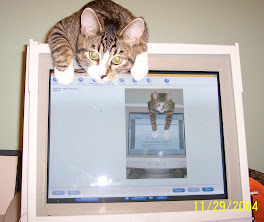
The latest issue of Library Journal came to my inbox yesterday, thanks to the wonderful Ebsco resources. I could barely contain my glee. The articles included two that I can't help thinking will be seen as good news by anyone who loves books and stories.
First, Library Journal gave lots of ink-space to Open Library, and heralded its call to libraries around the country to help with its archival goals.
A quote from the article:
Open Library is being developed as a partnership between the Internet Archive and Open Content Alliance (OCA) to create a free, global online catalog and library. In their view, the best way to represent books and their metadata online is to create a web page for every book.
These pages then combine the data found in traditional library catalog and publisher ... records with user-generated reviews, references, and discussions. For digitized public domain books... an ebook interface is included directly on the site. For those books unavailable in full text, links to buy, borrow, or download are also included. And to round out its all-encompassing goal of total descriptive content, Open Library plans to create subject and author pages as well. Once collected, this information will be updatable and editable by users.
One of the most interesting things about Open Library is the ideal on which it is based. Though only a demo version in its current state, Open Library aims to be a "product of the people: letting them create and curate its catalog, contribute to its content, participate in its governance, and have full, free access to its data."
I checked out Open Library's test page and it works like a charm. One of the books is Stories of the Foothills by Margaret Collier Graham, copyright 1895. The site lets you turn the pages of the book, seeing each page as it is in print. This is why we know that this particular copy was a gift to the University of California by the Class of 1900. There is a link for audio as well, although this particular book does not have any audio data. Still, these Internet archiving sites are fantastic resources.
I also like the Library of Congress' rare children's book site. If you want a glimpse of how much technology and culture have changed in the last 130 years, view the Children's Object Book, published in 1880-something.
Fabulous!
Another piece of exciting news is that the Espresso Book Machine is expected to be released commercially in 2008. I find this idea incredibly exciting. For those not in the know, the Espresso "can turn a PDF into a printed book in 15 minutes for a penny a page." This is revolutionary technology, and not only because it begs the question of why publishers would need to continue to print and warehouse hundreds and thousands of copies of their books. Personally, even though the article states that some publishers are pondering whether to publish only e-book, I have a hard time believing that consumers will give up the printed-on-paper book any time soon. That means that libraries will continue to have books in print to purchase, even as we move toward finding ways to provide e-book formats as well.
The really exciting thing to me about the Espresso is that it opens up the possibility that someday no book will ever go out of print. Think about that. No story will ever be lost to time. As long as the story is stored as electronic data somewhere, some gizmo like the Espresso or an e-reader will be able to deliver it into the hands of that one person in a hundred thousand or more who wants to read it.
As a writer and lover of books, I find that thought to be profoundly thrilling.





No comments:
Post a Comment